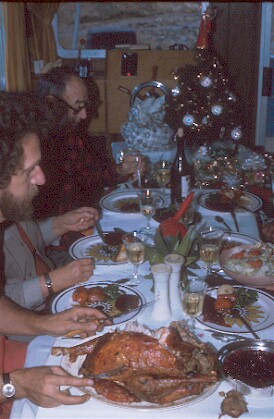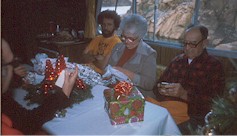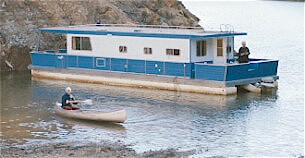HAPPY HOLIDAY HOUSEBOATING
by Annette LucidoHoliday Houseboating offers peak pleasures for bottom dollar.
The lady at the houseboat rental service on the other end of the line clearly thought I was crazy when I asked her the inside measurements of our 12-sleeper's oven. A pause and an "I'll check" led to muttered conversations in the background and the eventual answer. Why did I need that information? We'd planned a "holiday houseboating" trip over Thanksgiving and I needed to know how big a turkey to buy. On this trip a 16 pound bird did the job. On our other trips at Christmas or Easter we've sized birds to fit, and toted the appropriate decorations, gifts and, in one case, even our own Christmas tree and ornaments.
Frankly, such holidays are the prime times on most waters. Summer crowds are gone. Prices are lower than usual, and it's a chance to enjoy your group. Admittedly, houseboat rentals aren't cheap. Boats that sleep from four to 12 can cost from $500 to $1200 a week or even more. But such costs work out to be less per person than you might expect if shared with other couples or an entire family tree. After all, once you have your food and gear aboard, there are no other expenses save the gas you use. So compare your total costs, not just lodgings.
 Holiday table afloat builds indelible memories.
Holiday table afloat builds indelible memories.
Photo by Annette Lucido
We find houseboats particularly suit three generation family trips. On one trip our age range ran from 93 to 6! My father-in-law became the official "angler in charge." We watched the lines trolled off the bow and, when there was a hit, had someone go out and reel in "his fish." My father, who loved boats, skippered. My husband and mother cooked. My mother-in-law sat, supervised and looked out the window. Everyone slept in except for my husband and brother-in-law who got up early and fished until breakfast. Everyone did their own thing. That defines a solid vacation for me!
There's enough comfort for those experienced enough to know that roughing it tests little save patience. There are no TVs or games, no phones and no distractions. Just do not overcrowd. Boats that "sleep 12" handle three couples with moderate privacy and kids can be stashed on deck under the bow overhang in mild weather. We've also marooned a giggle of teenage girls on their own private island and anchored just offshore to keep an eye on things. There was some motherly chat about the possibility of "heaving anchor and heading out."
If you book a larger party that requires more than one boat, and this can be a dandy trip for organizations and such, you might take a "snore census". Folks who bugle throughout the night should be quarantined on their own boat. Smaller groups seem to work out better. It's not unknown for large groups to get a bit of cabin fever if they are not careful to take along auxiliary craft.
Cutting Costs
Midweek, long weekend and off-season rates do cut costs. For example, in the off-season between Labor Day and Memorial Day you can save 30 to 40 percent at most spots. Given a careful eye on the weather to avoid major storms, the colder months offer their own special rewards. Fishing for trout and other cold water species can peak conveniently near the surface from November until March in mild weather areas. Best of all, you avoid summer crowds and, with the shelter offered by your floating home, need not worry about cold weather. Warm, dry clothing plus hot coffee and a heated cabin just a few steps from the fishing off the stern avoid chilblains.
Do ask about "rain checks!" Most rental agencies offer one free rescheduling during off-season when they are anxious to book rentals. This allows savvy houseboaters to reschedule if the weather does not look good without losing their deposit. You can write or call three different liveries -- should these be available in your area of choice -- so you can compare prices and features. In response, you will doubtless get a booklet that lists items included with the boat. These vary more than prices, which seem a fair indication of what you get!
Creature Comforts
A flush toilet, hot shower and/or snug tub and a wash basin handle cleanup. Kitchens usually come with ovens large enough for a turkey. Four burner stoves, a small propane refrigerator with a freezer compartment and, in most cases, at least one ice box and cooler are standard. You buy the ice; propane is usually included in the rental fee. You may need to buy charcoal and starter on some older boats which use this kind of grill; newer craft have propane grills. Tip: bring wooden kitchen matches. Paper ones get soggy!
The best packages add pillows, blankets and linens, plus all cooking gear, plates and utensils. On longer trips you can head back to the marina to replenish linens and, if needed, have your boat's holding tanks pumped clean.
Most boats come with cassette or 8-track tape decks -- bring your own music if you prefer classics. Most boats run to country and western and pop. A most usual option is a CB radio you can use to ask other boaters about fishing or to call for help if you get stuck or suffer a mechanical breakdown. In warmer areas it's not unusual to have a generator and/or on-board air conditioning too. 
Auxillary craft offer considerable convenience and increase options.
Some rental agencies toss in an auxillary craft that's handy for shuttles, fishing and messing about. If you own a boat, bring it and set it up for towing. This keeps peace in the party when some want to troll and others want to sleep
Go Light
After you book, it is time to pack. While most first-time houseboaters bring one of everything "just in case," you should not! Clothing needs afloat are minimal and depend on the area and season. On long trips you can hit marina laundromats if you need. Shorts and short-sleeve tops are standard; swimsuits usual in the summer, and a windbreaker, sweater and wool hat suit brisk evenings. Do bring long-sleeve shirts and long pants and sunblock lotion, sun glasses and a wide brim hat for sun protection. Sun off the water does fry the unwary. Two pairs of shoes and extra dry socks are recommended. Sandals or sneakers work, but wise boaters do not go barefoot with so many things on which to stub tender toes. Bug dope -- we use 100% DEET -- is a must. While bugs are not a major problem under way or moored in breezy areas, biting bugs send you from the deck to the screened deckhouse in short order if you moor in a calm area.
Managing Munchies
I won't tell you what to bring to eat although most folks bring twice as much as they should -- then eat it all anyway! Keeping it simple and using the standard propane grill eases the cook's task. Last trip we grilled wild duck in plum sauce and pheasant with an Italian marinade and served it with potato salad and corn on the cob. A berry pie completed dinner. We do pancakes -- mix dry ingredients at home -- add blueberries as you cook. You can cook bacon for breakfast in a pan on the grill outside too. We often use a vast assortment of lunch meats, cheeses and hard rolls for dinner. Do tote enough soda and such. Prices at home are lower than at the marina. TIP: shop in a nearby town supermarket and you can save too.
Captains Courageous
On arrival, you get quick look at the boat's features and, in some cases, a short shakedown cruise. It's important that everyone pay attention to how stoves work, toilets flush and the like. In particular, try to conserve electricity and water. These points are well-known to most boaters. The rather odd behavior of pontoon houseboats may not be! Houseboats come in two major "flavors." Conventional "V-bottom" craft handle like standard boats and usually run to bigger engines to suit sometimes rougher waters.
Twin hull houseboats designed for more sheltered waters feature a huge cabin, small pontoons with rather limited "grip" on the water and, in most cases, a rather conservative 50 to 60 h.p. motor on the stern. These houseboats can be a handful in strong winds. If possible, try to approach docks, banks and such by heading into the wind to ease handling. Note: displacement hulls don't go much faster at full-throttle than at half-throttle, they just use twice as much gas. So you might stick to trolling speeds, which save on gas and fill the stringer. Stick to sheltered coves too.
Try to moor so it's easy to set out the lines from bank pins to stern. Note: we tote an extra line to set three lines instead of the usual two just in case.
In summer, when reservoirs fall a foot a day, it's not unknown to nose into a sandy bank for a couple of days; then find the bow stuck. Water levels also change radically in tidewater and on rivers controlled by dam releases. So you might want to reset moorings now and then. Do watch bridge clearances. We saw a California delta houseboat booming down current and down wind rip the top off its cabin. Seems the "skipper" made the bridge a few hours before at low tide, but a two foot increase in water level at the tide's top canopenered his craft.
With these points in mind operation is easy, and if you have problems help is almost always nearby. About the only problems most face is running out of gas, or toilet paper or ice, or running down the battery with all-night parties. On larger waters, radios are usual so you can call or hang out what experienced boaters call "the dummy flag" to get help if you must.
Of course, you don't really need to plan houseboating trips as carefully as jaunts into the Canadian Bush. You can buy what you leave home at marinas. Still, houseboating does seem most pleasurable when you know that you have the best possible boat at the lowest possible price and haven't left anything home. It's best of all during the holidays.
